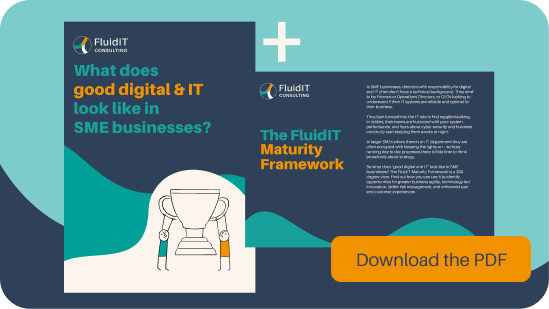This can be as light touch as fractional IT leadership to oversee an entirely outsourced IT provision, or supplementing their Managed Service Providers (MSPs) with a dedicated IT team and on site desktop support. However growing numbers of SMEs need an internal capability that goes beyond traditional desktop support.
Key questions to ask the business:
- Are good practice software development and IT policies in place to manage IT risks?
- Are internal IT operations and user support sufficient to meet business needs?
- Does your IT function enable innovation, or hinder change?
- Have you got access to the right blend of IT skills and capabilities, whether internally or via a third party, to meet the challenges of digitalisation?
What does this often look like in average SMEs?
Many SME businesses don’t have inhouse software development capability, and some expect employees with limited capacity and experience to ‘have a go’. IT policies are often not fit for purpose, procedures are often ad-hoc and undocumented and the internal IT operations and support can feel unresponsive, siloed, overwhelmed, and reactive.
Lacking access to the broad range of skill sets and deep solution expertise that effective digital change requires, many SME business remain frustrated by under-used off the shelf systems, poorly integrated point solutions, poor user experience and a monolithic inflexible architecture.
Business partnering by IT is often poor or absent, meaning the business becomes frustrated by an IT team that isn't focussed on their priorities.
What does good look like?
Mature SME businesses build diverse multi-disciplinary teams that can cope with the many demands of their users, or collaborate with trusted partners who offer fractional resources and solution agnostic expertise as required. Their modern IT function partners effectively with the business, helping to identify technology investments that deliver a return on investment, and are aligned to business outcomes. They outsource more basic IT operational functions where possible through wider adoption of cloud technologies and Infrastructure as a Service, in order to focus on more value adding activities. They are flexible, with a ‘can do’ attitude, appropriately balancing risk appetite with organisational agility.
Mature SMEs will have a good range of IT policies and procedures which are reviewed and updated regularly in line with business operations. Users are supported with good self-service tools and rapid proactive service delivery for their day to day needs.

"We couldn’t employ just one person with all those skills and abilities, our payroll bill would go through the roof.
Obviously we could look for all of these people ourselves but it’s far better for us if Fluid does it."
Mark Teasdale, Whitby Seafoods
Financial Controller
